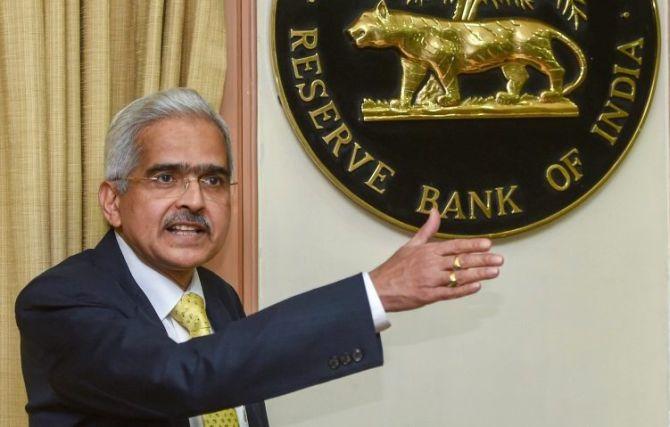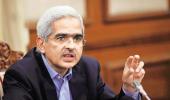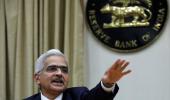Central banking is a science, not an art, Tamal Bandyopadhyay tells RBI Governor Shaktikanta Das.

Dear Governor,
The day you took over as India's chief money man, you tweeted: 'Assumed charge as governor, Reserve Bank of India. Thank you each and everyone for your good wishes'.
A few days later, after the board meeting, you tweeted again: 'Good meeting of RBI central board. Wide ranging issues discussed'.
I don't know about global central bankers, but this is the first time a Reserve Bank of India governor is using social media to communicate.
You have ushered in glasnost on Mint Road. Thank you.
If this is unheard of in the RBI's history, the series of events leading to your arrival at the central bank is also unprecedented.
Indeed, there were occasions of an RBI governor resigning, but there has never been so much public display of acrimony.
You were also on the RBI board.
That's your advantage.
In 1997, Bimal Jalan took over as RBI governor when the East Asian financial crisis spilled over to India.
A week later, D Subbarao parachuted from the finance ministry to Mint Road in September 2008 after iconic US investment bank Lehman Brothers collapsed, plunging the world into its biggest financial crisis.
His successor Raghuram Rajan took over in the thick of the taper tantrum when foreign investors rushed to pull out money from India.
Your move into the corner room of the RBI headquarters is equally eventful, but more complex.
It has nothing to do with the external environment.
The macroeconomic indicators are also not too bad -- inflation is low, the local currency is stable and the threat to India's current account deficit has been receding with the sharp drop in crude prices.
But there is a deep mistrust between the government and the RBI.
I have also never seen such a trust deficit between the regulator and the regulated entities -- the banks and other market players.
You soothed many frayed nerves by vowing to preserve the autonomy of the RBI and build consensus on every critical issue.
You have also reached out to the public sector bankers.
Your October 18 tweet gave me a sense of your approach to central banking: 'Central banks across countries have a very critical role at the current juncture. The challenge is to try and read the situation and take decisive steps in pursuit of their multiple responsibilities'.
Your immediate challenge is to convince the global markets that the RBI will not surrender its autonomy.
And, the public perception about the RBI's autonomy is as important as autonomy itself.
This means your belief in autonomy is not enough; you need to demonstrate that by action.
Of course, autonomy is intricately linked with responsibility.
In this context, I would like to flag off a few issues.
I won't dare to advise you or even give suggestions.
These are just few observations from someone who has been tracking the Indian central bank for long.
- The RBI has created an enforcement cell recently -- a valuable addition to the organisational architecture. But compared with most central banks in developed markets, its market intelligence is poor. Probably, a dedicated cell will do the job better.
- There is a technical committee on financial markets, but I am not sure how many meetings it has held in past few years. You may not agree with the market participants, but what's the harm in listening to them? Senior executives of the central bank have also stopped attending the meetings of industry bodies such as FIMMDA (Fixed Income Money Market and Derivatives Association of India) and FEDAI (Foreign Exchange Dealers Association of India) which represent the community of bond and foreign exchange dealers.
- The RBI vision document on payments (covering the period between 2015 and 2018) spoke about setting up of an external committee on payments. Has anybody heard about this?
- Probably you would also need to create a panel, including external members with impeccable integrity and expertise, to look into regulations and governance. Currently, the Board for Financial Supervision (set up in 1994) looks into financial regulation and supervision but its focus is primarily on inspection and audit. Based on feedback from different participants, there could be a framework for regulations.
- You may also look at creating a framework for three other critical issues -- inflation forecasting, liquidity management and RBI intervention in foreign exchange market.
On several occasions in the past few years, the RBI's inflation forecast has been off the mark. This dents its credibility and also influences the Monetary Policy Committee's approach to the policy rate.
Right now, overnight call money rate is the prime measure of systemic liquidity. But call money is a very small portion of the entire system. Shouldn't we have a framework for managing transient and durable liquidity?
What is the right level of local currency?
How do we measure volatility in the foreign exchange market?
The RBI doesn't need to tell the market the preferred rupee-dollar exchange rate, but there should be a framework to decide this. Right? - Also the RBI should welcome investment bankers, private equity managers, treasury experts et al at a senior level. Globally, central bankers do this to build in-house expertise.
Similarly, RBI executives should be encouraged to have stints in the private sector to hone their skills.
And, instead of a democratic transfer policy where executives are periodically rotated through different departments, I think making some of them stick to certain assignments will help build expertise. - RBI should also consider setting up an appellate body to deal with bankers's dissatisfaction.
It doesn't need to be like the SAT (Securities Appellate Tribunal), a separate body to which one can appeal against Sebi (Securities and Exchange Board of India) orders, but it can be on the lines of the Regulatory Decisions Committee of the FSA, UK. It's an FSA board committee, but operationally separate from the rest of the UK regulator. - Finally, you would need to revive the almost defunct local boards of India and recast the central board if you want to change the advisory board into a supervisory board.
Of course, the government will play a key role here and your familiarity with North Block will come in handy to get this done.
Central banking is a science, not an art.
By experience, expertise and intuition, most past RBI governors have done a phenomenal job. Appreciation for feedback, efforts towards consensus building and a framework for different policies will perfect that science.
Wishing you a wonderful innings,
Yours sincerely,
Tamal Bandyopadhyay
Tamal Bandyopadhyay, a consulting editor of Business Standard, is an author and senior adviser to the Jana Small Finance Bank Ltd.












 © 2025
© 2025